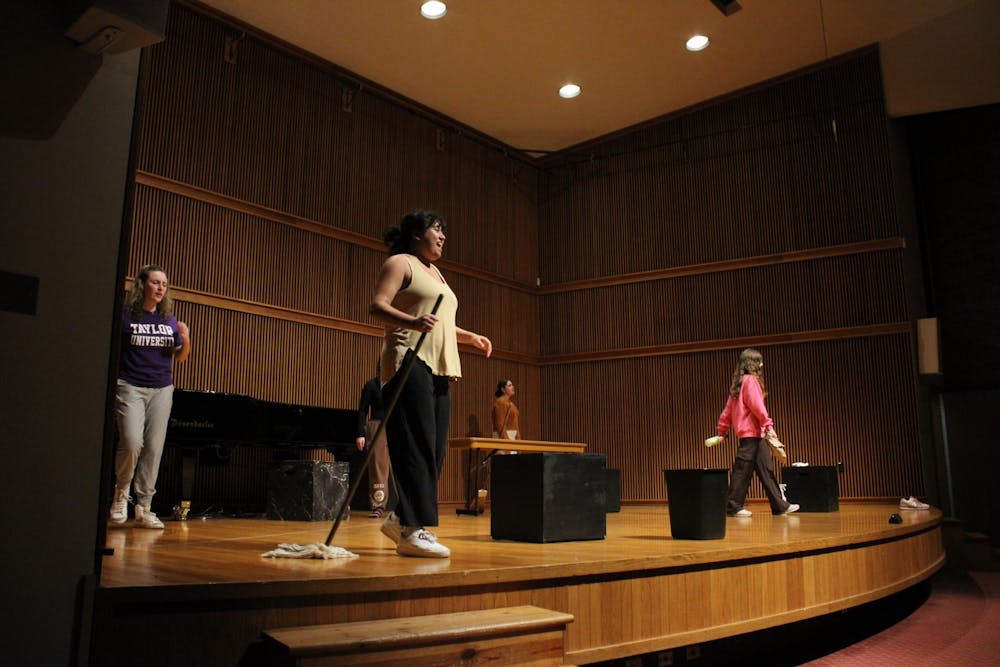This January, the lights dimmed in the Recital Hall, allowing audience members to settle into their seats as the first strains of “Working: the Musical” soared out.
Written by Stephen Schwartz and Nina Faso, with lyrical contributions by renowned artists such as Lin Manuel Miranda and Micki Grant, “Working” and its powerful story captured the hearts of students and faculty members alike, according to audience member Grace Kendall.
The play aimed to depict the motivations coming from various backgrounds and vocations, allowing them to be seen by the audience as human beings, not just faceless members of the American workforce.
“We focused on finding characterizations that were built on what individuals wanted, not what they didn’t have,” said Conor Angell, professor of music at Taylor University and director of “Working.” “Even though many of these people had difficult circumstances, they were working toward a possible ‘victory’ that would give greater fulfillment to them or their posterity.”
Angell’s intentionality with the story, characters and central themes of “Working” was taken on and reflected by the student performers themselves.
The musical involved dozens of characters, requiring each actor to play multiple roles throughout the show.
“The way my characters affected me was that they all wanted a purpose,” freshman Milo Guevera, an actor in the musical, said. “Some of them wanted connection with other people or some of them wanted a good day’s work, and so it was interesting to see how ordinary people go through their lives. Their introspection made me feel introspective.”
The cast, crew and directors were not the only ones affected by the introspective nature of “Working.”
Freshman audience member Grace Kendall said she was able to have many thoughtful conversations with friends after seeing the musical.
“We all interpreted it differently,” Kendall said. “I loved seeing a portrayal of the real world– it wasn’t sugarcoated. There is oppression and people finding their worth in a job and not finding opportunities. I liked seeing how real it was.”
According to Kendall, Guevara, and Angell, characters portrayed on stage were more than typecasts of the American worker. Working’s actors strove to portray characters that replaced traditional stereotypes with raw, vivid characters.
Schwartz based the story of “Working” off of a book of work interviews published in 1974. As a result, every individual in the musical was based off of interviews Schwartz conducted with a real person. This reality of the story as expressed by audience members makes the show itself even more profound.
Kendall agreed.
“I think a lot of people were able to see outside of our Taylor bubble,” she said. “There’s a lot of people who don’t have many opportunities and they’re fighting to provide for their families. There’s a lot of reflection of how blessed we are to be here.”
Other audience members shared conversations surrounding the themes and characters of “Working”.
The cast, crew and faculty members said they enjoyed watching their hard work spark discussion surrounding workplace stereotypes
“We weren’t really sure how people were gonna feel about it, if they would enjoy it,” said Milo Guevera. “Overall it seemed like positive feedback.”
Guevara expressed excitement over discussing performance with family and friends. He said they found their performance believable and true to life.
Dr. Angell said he felt accomplished hearing the Taylor community’s reaction to “Working.”
“I have heard many words of appreciation, not only for the vibrant singing and dancing,” said Angell, “but also for the thought-provoking stories that our cast told with compassion and believability.”
Though the curtain fell on this production, the impact of “Working” will continue to shape this community’s view of what it truly means to live worthy of our calling ”all the livelong day,” in the words of Stephen Schwartz.





